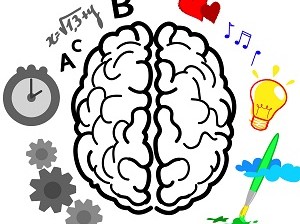Tag Archives: fuzzy logic
18 Apr Irrational Language Rules

Language and Utterances Now let’s narrow the focus from communication to language. To avoid confusion, let it be clear from the outset that this discussion is not concerned with computer-programming languages, but “natural languages.” Computer languages have built-in or “prescriptive” regularity called a formal syntax. They are easy to describe, and they are obedient to […]
09 Apr Abstract Contexts and Fuzzy Reasoning

We do not yet know how we remember things, nor do we know how we use remembered things in reasoning. The amazing feedback loops of afferent and efferent fibers between different layers of the cortex give us some amazing clues (Hawkins 2004). Today’s discussion of abstract contexts and fuzzy reasoning is intended as a bridge […]
08 Apr Symmetrical Logic and Lineage

Symmetry may not immediately appear as a principle of logic or reason, but it should. In mathematics we learn the commutative and associative properties of addition and multiplication. These represent a mirror-like symmetry. Symmetry, or invariance against change, is a fundamental principle of physics and an underlying assumption driving some logical decisions. Causality, for example, […]
02 Apr Context and Expectations

Expectations are context based, top-down ideas of what comes next. These top-down ideas feed perceptual processing centers in the brain, helping us focus on what matters, ,and sometimes blinding us to other possibilities. The two types of context we will consider today are sensory and non-sensory. Sensory context applies to anything in the physical world […]
01 Apr Generating and Qualifying Propositions

What are the limits of reasoning? Is it possible to reduce every cognitive activity (telling time, falling in love, inventing rockets…) to a set of premises and conclusions: propositions? LITTLE ANIMALS ARE FURRY is a very simple proposition. Can intelligence be defined by the complexity of the sequence of propositions we can balance in evaluating a situation? I […]
31 Mar Truth, Belief and Confidence

Establishing frameworks for truth, belief and confidence can be part of raising a child and part of building a more intelligent system. Parents in households of faith often feel a compelling need to teach their children about things that are outside the realm of scientific discovery. In espionage, intelligence analysts review information collected by agents, electronic snoops, and […]
29 Mar Is Anything True or False

I like to use pictures in my posts. The more evocative they are, the better. Why? Because they may trigger brain activity in areas that may be otherwise untouched by my writing. In other posts, I speak of this brain activity as “patterns of activation” (Understanding, Vision, Enchanted, Flow). If we think in patterns (Tou 1974), […]
28 Mar Is Everything Black or White?

We have exercised our abstract ideas about that which is too big and chaotic for us to understand (everything), let’s take a glimpse at that which is so small and chaotic that we may never really figure it out: the workings of the mind. In the next few posts, we will examine different forms of logical […]






